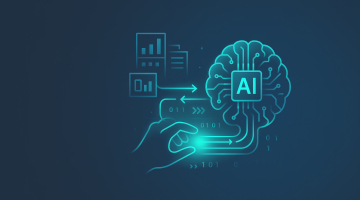

AI-powered business transformation: Key benefits and challenges
In the increasingly competitive and tech-savvy modern business landscape, the necessity and indeed inevitability of an all-embracing digital transformation has come home to senior executives of all companies across different industries poised to go big-time. But while a couple of decades ago, it meant harnessing the internet and basic professional software, today, staying afloat, to say nothing of outstripping rivals, is possible only by making artificial intelligence solutions the backbone of the enterprise’s IT infrastructure.
This article showcases typical applications of AI in business and explores how organizations can leverage AI tools to solve routine tasks.
Need professional consulting? Our experts will help you develop the right business transformation strategy powered with AI.
Business sectors where companies utilize AI systems
AI-driven know-how (machine learning, natural language processing, computer vision systems, various generative AI technologies, etc.) plays a pivotal role in the contemporary digital world, giving employment to 97 million people globally. Currently, the AI market’s value equals $391 billion, and it is predicted to increase five times by 2030, reaching $1.8 trillion at a stunning CAGR of over 37%.
As artificial intelligence gains ever wider traction, C-suite managers develop approaches and learn strategies for integrating AI into their enterprises’ business models. And the number of companies embracing the power of this innovation grows exponentially. Ten years ago, only 10% of businesses used or planned to use AI-fueled software; in 2019, this figure rose to 37%, and nowadays, 83% of companies define AI as the top priority in their strategic development plans.
What are the areas where AI solutions bring the most value?
SECtors using AI
Customer service
Previously, this domain relied heavily on human skills of interacting with consumers and employees’ emotional intelligence. Large language models powering chatbots help minimize customer support personnel and handle most users’ inquiries concerning the company’s products or services.
Human resources
Recruiting the workforce can be essentially streamlined and facilitated by delegating resume analysis to AI mechanisms and empowering HR managers to adopt informed decisions concerning candidate screening and selecting the most suitable applicants.
Marketing and sales
AI tools have enormous data analytics capabilities, allowing them to sift through tons of client-related data and gain insights into customer behavior or purchasing habits. These findings become the vital knowledge base for specialists who develop sales strategies and plan marketing campaigns geared to boost customer engagement and drive conversion rates.
Supply chain management
Here, data-driven decision-making enabled by AI tools helps improve the overall efficiency of the supply chain, optimize inventory management, and ensure seamless logistics.
Finance
This disruptive technology paves the way to large-scale financial reporting automation and provides data-driven insights instrumental in investment planning, portfolio management, fraud detection, credit and insurance underwriting, and other workflows hinged on predictive analytics.
Let’s see how AI transformation can revolutionize addressing complex tasks across these and many other use cases in professional contexts.
Experiencing a lack of technical expertise and skills?
Connect with a professional team to address your project challenges.
10 applications of AI for business transformation
As a leading IT vendor with a focus on artificial intelligence, DICEUS believes that AI-based tools can become a game-changer in the following areas.
Applications of AI for business transformation
AI-powered customer analytics
AI solutions excel at analyzing huge volumes of customer data obtained from social media, surveys, purchasing history, and internal resources (CRM, ERP, etc.). The result is creating a 360-degree picture of the clientele that includes all relevant information, starting from demographics, income level, and culture down to their buying behavior, complaints, and pain points. These insights help companies modify their business techniques and hone their competitive edge.
Tailored marketing strategies
Given the growing need for a personalized approach, in-depth customer data analysis becomes mission-critical in launching highly tailored marketing campaigns. Armed with exhaustive knowledge about their clients’ tastes and preferences, companies can exploit unique cross-selling and upselling opportunities, offer products and services that align with customers’ expectations, and provide individualized product recommendations, thus ensuring ultimate customer experience and fostering brand loyalty.
Software product innovation
The launch of successful solutions is impossible without wearing the user’s shoes. AI mechanisms can look at the product’s performance from a customer’s perspective, making clear what can be altered or improved. Besides, AI is a great crutch in the software development process itself, facilitating its successful completion by generating UI design variations, automating repetitive tasks, and suggesting new features to address specific business problems.
Data security
This is one of the essential ethical implications related to AI employment, which is why organizations leveraging this technology in their AI projects pay serious attention to it. And AI tools help them a lot in this aspect by detecting security risks in real-time, learning about new types of cyber threats, and instituting proactive steps that strengthen the company’s protection perimeter against data leakages and penetration attempts.
Supply chain solutions
To maintain uninterrupted business continuity, enterprises must make sure their stocks never run low, but at the same time, avoid overstocking, which entails greater warehouse expenditures. Specialized AI software allows them to upgrade supply chain control, keeping track of inventory levels, predicting demand for certain goods, increasing the efficiency of fleet management, and choosing optimal delivery routes.
Chatbots and virtual assistants
Today, high-quality and cost-efficient customer service can’t do without NLP and ML-driven chatbots and virtual assistants. Introduced as simple solutions that were honed to answer elementary questions or offer advice, they have evolved into intelligent 24/7 conversational tools that can provide near-human communication, recognize people’s emotions, and learn from past interactions. Their increasing capabilities are widely utilized in healthcare, finance, insurance, and other verticals, freeing employees to deal with more meaningful or complex assignments.
Talent management
The most evident AI application in this area is related to the improvement of the hiring routine. HR specialists can leverage AI algorithms to select the best candidates for a certain position with the optimal skill set required by the job. Besides, an organization’s senior managers can create an entire personnel governance framework in which AI tools are utilized to assess workforce performance, identify the most efficient employees, establish equitable pay, and deliver tailored workplace experiences, thus contributing to augmented staff satisfaction and retention.
Legal and compliance
While this aspect is pivotal for most niches, the majority of tasks in it are time- and effort-consuming. AI solutions can perform them much faster and with greater accuracy, being involved in identifying suspicious activities through detecting patterns and anomalies, simplifying investigations and reporting (like generating suspicious activity reports – SARs), monitoring regulatory changes, and analyzing legal documents (such as agreements, contracts, policies, and more) to verify their compliance with the existing laws.
AI-powered financial analytics
In this domain, AI can be applied in numerous use case scenarios, namely for pinpointing spoofing, cyber threats, and fraudulent transactions, processing financial documents (for instance, income statements, balance sheets, cash flow statements, you name it) utilized in loan servicing, investment discovery, and other processes, delivering personalized recommendations concerning financial products, forecasting customer demand fluctuations, and more.
Synthetic data generation
This is where AI serves AI. Artificial intelligence models need vast amounts of data for training, which may be difficult or expensive to acquire. When properly applied, generative AI systems excel at producing synthetic data in any quantities and in all formats (texts, audio, video, images). Such data sets are more suited for training purposes since they are unbiased and aren’t subject to copyright laws. Once generated, synthetic data is employed to prepare newly built AI-based solutions for analyzing real-world data.
Given the plethora of possible AI use cases for business transformation, it is evident that organizations should develop bespoke AI-based professional products to address unique challenges they face in their shop floor operations. DICEUS is your number one choice for an IT company to do that. Our seasoned engineers possess both expertise and experience in custom AI software development to deliver the best-in-class enterprise solutions that will revolutionize your workflows and drive business growth.
To sum it up
Trying to expand their customer base, boost revenues, and achieve other business goals, enterprises across multiple verticals push the technological envelope by harnessing disruptive innovations in the IT realm. Today, the most powerful high-tech tool capable of reinventing key pipeline processes is artificial intelligence. Organizations leverage various AI-driven technologies (ML, NLP, generative AI, LLMs, computer vision, etc.) in customer service, marketing, finance, supply chain management, and other business domains.
When crafted by vetted professionals in the AI field, tailor-made AI solutions can boost customer analytics, help devise personalized marketing strategies, ensure rock-solid data security, launch virtual assistants and chatbots for seamless client-brand interaction, improve personnel recruitment and talent management, guarantee regulatory compliance, enhance financial analytics, participate in synthetic data generation, and more.
Employing artificial intelligence in these and other use case scenarios, companies can radically transform business practices, thus sharpening their competitive edge and providing the ultimate customer experience for clientele.
Frequently asked questions
How is AI transforming businesses with innovative strategies?
AI-based solutions find multiple applications in such areas as customer service, finance, marketing and sales, supply chain management, human resources, and more, where they are extremely useful for delivering customer analytics, helping develop tailored marketing strategies, supporting software product innovation, providing advanced data security, streamlining talent management, improving compliance, boosting financial analytics, generating synthetic data, and more.
What are the key stages in the evolution of AI in the corporate world?
At the dawn of their enterprise application, AI solutions were leveraged mainly for basic data analysis and content creation. Today, mainstream AI tools function as intelligent assistants that can automate repetitive tasks, diminishing the need for a human workforce in certain business operations. The next generation of AI-based software, which is about to disrupt the corporate world, includes AI agents capable of high-level reasoning and decision-making without human intervention.
How can AI-driven customer insights enhance business performance?
AI-powered tools can retrieve customer-related information from multiple external and internal sources, helping companies draw a comprehensive picture of their clientele. Knowing everything about consumers’ demographics, purchasing behavior, tastes, and pain points, organizations can fine-tune their marketing and sales strategies and provide the ultimate customer experience for them.
What are the benefits of AI-powered financial analytics for businesses?
Employing AI-driven solutions and tools in financial analytics, businesses improve risk management by detecting spoofing and fraudulent activities, streamline and facilitate financial document processing, forecast customer demand preferences and their fluctuations, deliver personalized recommendations related to the choice of financial products and services, and more.





